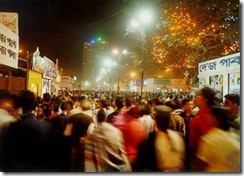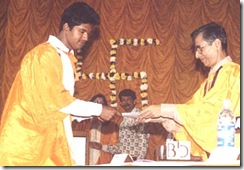[ad]
 Calcutta Book Fair is a very queer phenomenon. In times of receding book culture, this fair has brought multitudes to the milieu of books, and smiles to the faces of writers and publishers. One is surprised at how popular this annual event has become. One needs no statistics that outside the serious student who customarily visits the College Street, and the rare casual book reader who buys one or two, the books hardly receive any patronage. And yet come the end of January, and the Maidan air is thick with dust and smell of books. Calcutta has always been called (for whatever reasons) the culture capital of India (as if other parts of India are shorn of ‘culture’), and this late craze with books lends further credence to the added, rather preposterous claim of Calcutta being the intellectual capital of India. Of course such branding makes for chauvinism, but if the general Calcuttan is asked, he or she takes evident pride at this annual event. Other cities to have their own book fairs, with even more grander titles like Indian Book Fair, Asian Book Fair, or even World Book Fair – some, from time to time, and some regularly- but perhaps nowhere is seen this popularity verging on craze. One does not know if the average Calcuttan is fond and fan of books, but at least for two weeks he/she is. So what makes it so? My surmise is – Marketing. The Calcutta Book Fair has been marketed like nothing before or since. For the last ten years the Calcutta Book Fair has been branded a part of Calcutta culture- and if one know what pride a Bengali takes in his/her culture, one knows that it was indeed a very good tactic. Every year sees more and more stalls crowding at the fair, more and more books published just before the fair. The government does not show half as much interest in governing as it shows in staging this event- and ever since Buddhadev Bhattacharjee, a confirmed book and culture loving intellectual, became a part of the government (who, about a year and a half ago, became the Chief Minister), the fair has received a staunch patron.
Calcutta Book Fair is a very queer phenomenon. In times of receding book culture, this fair has brought multitudes to the milieu of books, and smiles to the faces of writers and publishers. One is surprised at how popular this annual event has become. One needs no statistics that outside the serious student who customarily visits the College Street, and the rare casual book reader who buys one or two, the books hardly receive any patronage. And yet come the end of January, and the Maidan air is thick with dust and smell of books. Calcutta has always been called (for whatever reasons) the culture capital of India (as if other parts of India are shorn of ‘culture’), and this late craze with books lends further credence to the added, rather preposterous claim of Calcutta being the intellectual capital of India. Of course such branding makes for chauvinism, but if the general Calcuttan is asked, he or she takes evident pride at this annual event. Other cities to have their own book fairs, with even more grander titles like Indian Book Fair, Asian Book Fair, or even World Book Fair – some, from time to time, and some regularly- but perhaps nowhere is seen this popularity verging on craze. One does not know if the average Calcuttan is fond and fan of books, but at least for two weeks he/she is. So what makes it so? My surmise is – Marketing. The Calcutta Book Fair has been marketed like nothing before or since. For the last ten years the Calcutta Book Fair has been branded a part of Calcutta culture- and if one know what pride a Bengali takes in his/her culture, one knows that it was indeed a very good tactic. Every year sees more and more stalls crowding at the fair, more and more books published just before the fair. The government does not show half as much interest in governing as it shows in staging this event- and ever since Buddhadev Bhattacharjee, a confirmed book and culture loving intellectual, became a part of the government (who, about a year and a half ago, became the Chief Minister), the fair has received a staunch patron.
Unless one has been to the fair one does not know what it means. A million people poring over books in half a thousand stalls in an area of a few hectares, is a sight indeed. The advanced countries sure cannot stage such an event- they just don’t have that many people. India being India, people will tolerate anything to be near what they claim as their heritage- the books- and given the number of Bengali books that come out, one is sure that the book business is going strong. The crowd, the dust, the lack of proper amenities (proper walking and moving space, telephones, water, toilet facilities, eateries, information centres, etc) does not deter the Calcuttan. Come rain or shine, he/she will pay the annul pilgrimage to the Maidan at least once. Some to it many times. Some visit the fair everyday that it lasts.
[ad]
The fair brings together many people. People selling books, people selling little magazines, people selling handicraft wares, people doing small road skits, people singing in a group and what not. Bookworm jostles with the book thief, and all have a merry time. Statistics are lacking as to, of the people visiting the fair grounds, how many actually buy books. One feels certain that a large number of people visit the fair grounds just for the experience- taking a look at books from all over India and the world, meeting acquaintances by chance, getting to ogle at celebrities who pay token visits, eating at the various stalls, and just hanging around with friends. All local books, and most popular books, are available at the College Street, and that too at much lower prices- and so the sensible desist from buying books at the fair.
It is said that the rich men buy books, and the wise men read them. If you want to have the best of both worlds, you buy as well as read them. If you are wiser you posses and read a book without buying them. Thus, at the fair, there is no shortage of those who are fond of possessing the books without the means. Previous fairs have seen attempts on part of the fair authorities to grant a semblance of respectability to this not-so-honourable means of procuring books. Thus, they made those caught red-handed sit in essay competitions, and then granted to them the stolen books on satisfactory composition. Even later attempts saw the authorities quizzing the caught person about the book, about the need of the book and about his/her economic condition, and on being given satisfactory answers, the books were gifted. Unfortunately this book fair saw the use of heavy handed means. Security was heavy, thanks to the first terrorist attack in Calcutta just a few days prior to the fair, and few would have ventured on such daring adventures as book lifting. My personal opinion is that the Book Fair would lose much of its charm without these colourful and desperate personalities. For my part, I think that the publishers are bigger thieves than the book lifters, charging as they do exorbitant prices for books that should have come cheaper.
![]()
I too have been paying my annual visit to the Maidan for the last ten years. Our family shifted to Calcutta from Adra (my father having a transferable job) on 5th of December, 1991. Two months later I went to Book Fair. Ever since I have not missed a single year, avidly waiting for that wintry fortnight when father loosened his purse strings a little bit. Myself being a great book lover (I am very fond of my personal library, and I would buy books even when I do not have immediate plans of reading them) I would save as much money as I could from the little I got, and then I would happily spend them. The smell of new books was even more mesmerizing to me than the smell of new bank notes.
Lately, however, the charm of the Book Fair has diminished a little bit. The prices of books and certain other mundane compulsions (many of the books that I really needed could not be found at the fair, and most of those useful books could be had much more cheaply at College Street) forced this awareness that the Book Fair is not so charming anymore. Perhaps a few years from now on when academic pressures would be gone, when my pockets would be lined with silk, I might find better use of this event. But for now I would rather pay my pilgrimage visit, and make do with as little purchases as possible. But undoubtedly, the Calcutta Book Fair has certainly had a positive hand in my education by fostering a love of books that was not there in the beginning.
Technorati Tags: Calcutta Book Fair,Kolkata,Books,Maidan
[ad]

